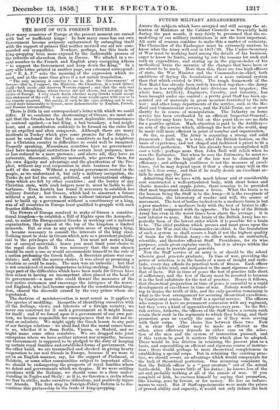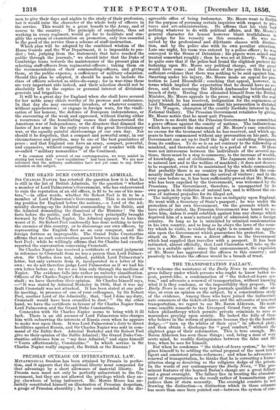.F U TURE MILITARY ARRANGEMENTS.
AMONG the subjects which have occupied and still occupy the at- tention of Ministers at the Cabinet Councils so frequently held during the past month, it may fairly be presumed that the re- modelling of our military institutions is not the least important. All sorts of reasons combine to make this a matter of certainty. The Chancellor of the Exchequer must be extremely anxious to know what the Army will cost in 1857-'58. The Under-Secretary at War must be working hard among the details of his business, eager to know its limits, conning by rote the reasons for such and such an expenditure, and storing up in the pigeon-holes of his methodical brain the minutiae of the changes that have been or are about to be made. More than this, there are two high officers of state, the War Minister and the' Commander-in-chief, both ambitious of laying the foundations of a more rational system than that which existed in 1854. The rough framework of the New Model has already been rudely knocked. together—the Army is more or less roughly divided into divisions and brigades ; the whole force, Artillery, Engineers, Cavalry, and Infantry, has been brought under one control ; a pretty good Staff has been ap- pointed out of materials in great measure furnished by the late war ; and other large departments of the service, such as the Me- dical and Commissariat services, and the Field-Train are or must shortly be in course of manipulation. The Infantry on home service has been overhauled by an efficient Inspector-General; the Cavalry may have been, but on this point there are no data for a positive opinion. Much attention is paid to the Artillery— an arm of the service which, although the best in the world, may be made still more efficient in point of number and organization. So far, so good. The Army is acquiring a strong and solid. framework ; built up, it is true, after the British fashion, on the basis of experience, and not shaped and fashioned a priori to fit a theoretical perfection. What has already been accomplished will cost a trifle ; 'perhaps more than John Bull will relish when he sees the Estimates. But when he sees the Estimates, he must re- member how in the height of the late war he clamoured for efficiency ; and although costliness is not the measure of excel- lence, yet he may depend upon it that a cheap army will in the end be a dear army,' and that if he really desire an excellent ar- tiele he must pay the price. Admitting that we have with much labour and at considerable cost constructed a well-articulated body, with stout bones and elastic muscles and supple joints, there remains to be provided that most important desideratum a brain. What the brain is to the human being the Staff is to the Army—it is the receptacle of information, the laboratory of resolve and will, the source of movement. The best of bodies tacked on to a mediocre brain is but a poor machine ; a mediocre body with the best of brains is effi- ciency itself compared with its opposite. The body of the British Army has even in the worst times been above the average ; it is now inferior to none. But the brain of the British Array has re- peatedly been of the lowest order which it is possible for a brain to be. The chief problem which presses and must press upon the Minister for War and the Commander-in-chief, is the foundation of such a system as shall secure a high if not the highest quality of brain for the British Army—in other words, an instructed, scientific, and therefore efficient Staff. Providence, for its wise purposes, sends great captains rarely, but it is always within the power of man to provide good generals.
Now the Staff service of an army is or should be the school wherein good generals graduate. In time of war, providing the power of selection is in the hands of a man of insight and recti- tude, every day affords its practical tests of fitness. Each officer is hourly on his trial, and subjected to the most rigorous of tests— that of facts. But in time of peace the test of practice falls short of sufficiency, and the test of theory must be resorted to because it is the best substitute for the test of practice. Hence it follows, that theoretical preparation in time of peace is essential to a rapid development of excellence in time of war. Nobody worth attend- ing to denies the truth of this, and the only question remaining is what is the best arrangement for securing theoretical excellence. In Continental armies the Staff is a special service. The officers who compose it have no permanent connexion with any regiment, but they serve a kind of apprenticeship to every arm. In the Bri- tish service, hitherto, the officers of the Staff below a certain rank retain their rank in the regiments to which they belong, and their promotion goes on exactly the same as if they were serving with their corps. The choice lies between these two. Now it is clear that either may be made as efficient as the other, since efficiency depends in either case on the selec- tion of the men and the system of instruction pursued, and if this system be good it matters little which plan be adopted. There would be less friction in retaining the present plan as a basis, and superadding an efficient and rigorous course of instruc- tion ; there would perhaps be more theoretical completeness in establishing a special corps. But in retaining the existing prac- tice, we should secure an advantage which would compensate for the lack of theoretical perfection. One recurring complaint is, that the British officer is a " poor creature" out of the actual battle-field. He knows little of his duties ; he knows less of the art and probably nothing at all of the annals of war. "If you complain of him, he excuses himself by saying that promotion, like kissing, goes by favour, or for money. He has no induce- ments to excel. But if Staff-appointments were made the prizes of proved ability and capacity, it would not only induce the best men to give their days and nights to the study of their profession, but it would raise the character of the whole body of officers in the service. This would be a great benefit to the Army, and of course to the country. The principle of emulation, thus set working in every regiment, would go far to facilitate and sim- p the system of examination on promotion, only less essential to the good of the service than a scheme of staff-instruction. Which plan will be adopted by the combined wisdom of the Horse Guards and the War Department, it is impossible topre- dict ; but, judging from the statements that have reached the public through the journals,* we should infer that the Duke of Cambridge leans towards the maintenance of the present plan of selecting staff-officers from regimental-officers ; taking them on the recommendation of their commanding-officers, and giving them, at the public expense, a sufficiency of military education. Should this plan be adopted, it should be made to include the class of officers selected as aides-de-camp ; for in war-time these are very important aids indeed, and their selection should not be absolutely left to the caprice or personal interest of divisional generals and brigadiers. It will be a great day for England when she shall have secured for her noble army chiefs worthy of its prowess and endurance. In that day she may encounter invaders, of whatever county, without apprehension; or engage in foreign wars, for the vindi- cation of her honour, the defence of European independence, or the succouring of the weak and oppressed, without fearing either a recurrence of the humiliating scenes that characterized the American war of Independence, or the disasters that dimmed the lustre of her arms in the early years of the great Revolutionary war, or the equally painful shortcomings of our own day. Nor should it be forgotten, that a compact and powerful army, in our circumstances and position, may be one of the best guarantees of peace ; and that England can have an army, compact, powerful, and expansive, without competing in point of number with the so-called "military monarchies " of the Continent.
* In common with several of our contemporaries, we were misled in stating last week that "new regulations " had been issued. We are now informed that the military authorities have not yet come to any deter- mination on the subject.

































 Previous page
Previous page